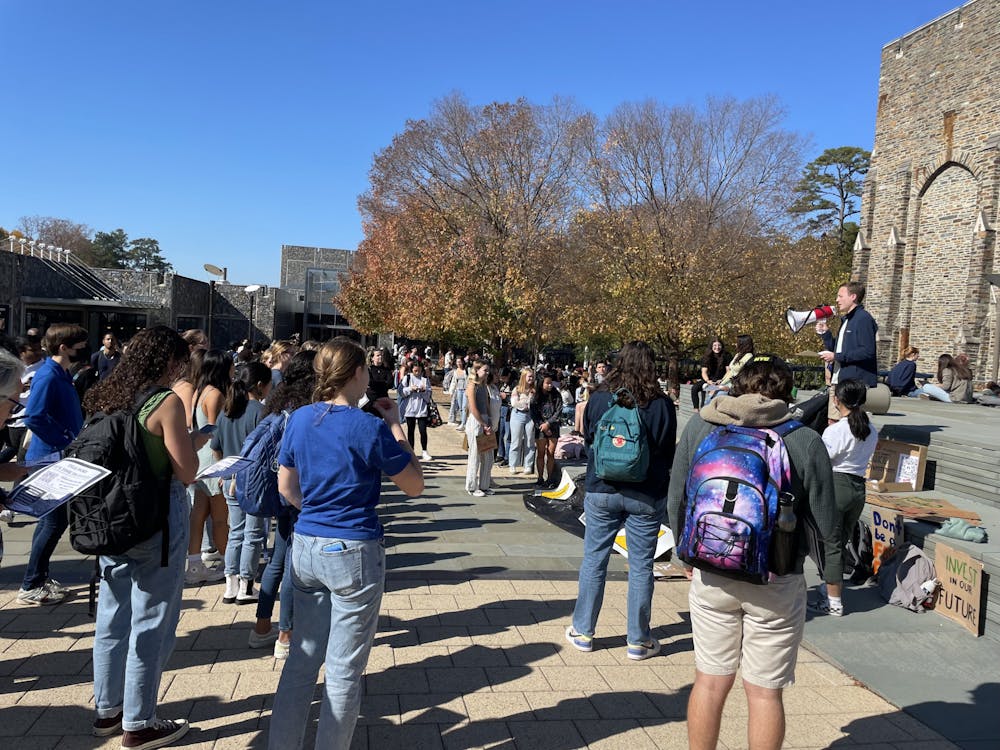“What do we want? Climate justice! When do we want it? Now!”
These chants from Duke Climate Coalition’s protest for fossil fuel divestment echoed across Bryan Center Plaza Thursday afternoon, where students and supporters gathered to demonstrate substantial student support for Duke to divest from fossil fuels.
The protest began with a speech by DCC Co-President Brennan McDonald, a senior. McDonald said that students need to stop supporting Duke’s “unrealistic business-as-usual model that has landed us in a planet wide crisis and start investing in a livable future.”
“The Duke administration has continued to reject divestment. This is a clear violation of the University's research and education mission and directly contradicts the contributions of Duke faculty to climate sciences and environmental activism,” he said.
In September, Duke announced a Climate Commitment supported by $36 million in initial gifts. The commitment lays out four areas of focus: energy transformation, climate and community resilience, environmental and climate justice and data-driven climate solutions. The commitment does not include a plan to divest from fossil fuels.
“We are excited to see this [Climate Commitment as a] positive step forward. However, we find it is utterly hypocritical of Duke to call itself a leader in the climate action space while it is still financially benefiting from some of the most polluting companies on the planet. Duke cannot have it both ways,” McDonald said.
According to the Duke Student Government divestment referendum first proposed in February, DCC estimates that 1-2% of Duke’s endowment is invested in fossil fuels, equating to about $127-254 million in assets.
Nearly 90% of students who voted were in favor of divestment during the March DSG elections. However, Duke administration has not taken any action, according to McDonald.
“[The protest] is a visual representation of how students are feeling right now. Our voices need to be heard in the process of climate action,” McDonald said.
The push for divestment at Duke began back in 2012 with phone banking, petitions and protests. The movement is part of a larger trend at many other peer institutions. Georgetown, Oxford, Brown, Cornell, Dartmouth and Harvard have all divested from fossil fuels.
“If Duke doesn't want to be left behind, they need to start working on it,” said McDonald.
Grace Jennings, a Duke senior and DCC co-president, hopes that the protest will garner more support among the student body and spread general awareness.
“We hope that if somebody brings up divestment in conversation, Duke students will be able to say, ‘Oh, I've heard something about that,’” she said.
McDonald said that the University does not disclose specific financial investments, which poses a challenge for students advocating for divestment.
The “[administration] has refused to tell us anything about what Duke has invested its money in. Without that we can't have good faith efforts to have a conversation about these issues ... And, so once we're on the same page and we have access to information about Duke’s exposure to fossil fuel companies and the endowment, I think that will be a really strong basis for productive conversations,” McDonald said.
The Chronicle reached out to Chris Simmons, interim vice president for public affairs and government relations, for comment, who responded with a link to Duke’s public financial reports and statements, which are posted for fiscal years 2001-02 to 2021-22.
Last year's financial report shows that Duke's real asset investments, which total over $2 billion and are "interests in funds or partnerships that hold illiquid investments," include those in oil and gas production, energy, residential and commercial real estate, other commodities and related services businesses. Breakdowns of exact amounts of each investment within the real assets are not outlined in the report.
According to the DSG referendum, the endowment is not managed by the Duke University Board of Trustees but is overseen by DUMAC’s board of trustees. DUMAC’s investments are advised by the Advisory Committee for Investment Responsibility.
In 2019, the committee advised that DUMAC not divest completely from fossil fuels, the referendum stated. That same year, the committee also rejected a 40 page long report written by the DCC that summarized the financial case for divestment.
DCC held a divestment protest in April and filed a legal complaint with the North Carolina attorney general.
Get The Chronicle straight to your inbox
Sign up for our weekly newsletter. Cancel at any time.
“[The complaint] outlines how the university has violated North Carolina nonprofit laws by refusing to divest from fossil fuels,” McDonald said. “We're hoping that this action will result in an investigation of Duke administration's investment policies and hold the administration accountable.”
Charlotte Kane is a Trinity sophomore and a staff reporter for the news department.

